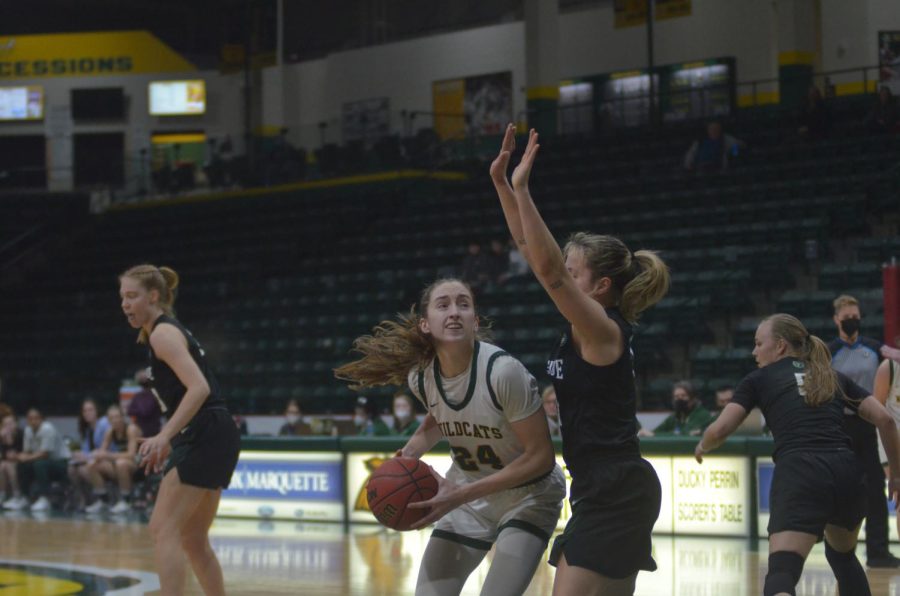On March 11, 2020 NMU joined the ranks of college campus closings due to the COVID-19 pandemic. Professors scrambled to move their in-person classes online in one weekend—and this was felt especially in the arts and sciences departments and for professors with limited experience using an online interface.
As of Wednesday, President Fritz Erickson announced distance learning will continue until the end of the winter semester. In other words, students and professors are not going back into the classroom this semester. Much of the university will exist in cyberspace.
How technology plays a role
Teaching online requires nearly double the amount of time and energy that course prep used to take, said Ryan Stock, earth, environment and geographical sciences (EEGS) professor. Technologically, the transition to online teaching has been relatively seamless, Stock said. Adding, however, the complications with online teaching are more psychological.
“My students and I are very anxious about the circumstances which has considerably changed class dynamics. However, our students are brilliant and adaptable,” Stock said. This week, he had a 68% ‘attendance’ rate in my synchronous livestreamed courses through Zoom.
For professors who haven’t taught online before or were not required to use EduCat, the shift online meant starting from square one. Native American Studies Adjunct Professor Shirley Brozzo said the transition has been “really difficult, but not undoable.”
“Basically, I had no idea how to access EduCat let alone try and use Zoom or anything that was on there. It was a really quick learning curve,” Brozzo said.
Despite technological advancements, some academic studies, like ceramics and chemistry, are restricted to a physical space and struggle to replicate a quality learning experience. And for Jason Schneider, assistant professor of woodworking and furniture design in the art and design department, this meant getting creative with making changes to his assignments.
Instead of continuing a desk construction project, Schneider asked students to come up with quarter scale models of desks with household materials—cardboard, tape, hangers, whatever they had access to. The assignment included drawing 18 designs, which Schneider instructed over Zoom on how to scale the models.
Thankfully, by the time classes were moved online late in the semester, Schneider said he was able to teach students the design process and how to use equipment in the woodshop. He is using this transition time to challenge students to invent designs and models, and refine woodworking projects.
Technology changes teaching styles
Online teaching requires different strategies than face-to-face teaching, Stock said. Previously he was able to roam around the room while lecturing, but is now limited to shifting his posture on screen, he added. In addition, he struggles to facilitate classroom discussions in smaller groups in the online format. Although features in Zoom, VoiceThread and Educat forums are helpful, Stock said he feels as if he, nor his students, have identified the most effective and enjoyable way to recreate class discussions online.
Brozzo said she also struggles to recreate class discussions online, as the nature of her courses are steeped in discussion.
“I’ve resisted teaching my classes on Educat because I think the context of these classes [Native American Experience and Storytelling by Native American Women] need the one-on-one classroom environment where you are talking face to face about these important issues and having an immediate discussion—not following some thread chat,” Brozzo said.
A sense of normalcy
When teaching in times of crisis, consistency and clarity are key, Stock said. He strives to provide structure by teaching during normal class dates and times, but via livestreaming.
Schneider is sticking to class times as well, with the expectation students will still be available.
“I don’t expect them to be there the whole session, because that’s a lot of time to be sitting in front of a screen. I look forward to a time where it becomes second nature to use this online platform,” Schneider said, “Right now, I find it to be a fun challenge and I hope my students are enjoying it as well.”
Students surpass challenge with adaptation and resilience
Students are incredibly resilient, Stock said. They are on the frontlines of this public health crisis, economic recession and en masse academic experiment with online teaching, he added.
Prior to the crisis, many students were economically insecure and now several working in the service sector or at NMU just lost their jobs, Stock said.
“And yet they still virtually attend my livestreamed lectures, still submit their homework, and still remain engaged in class discussions despite the chaos. In addition to inspiring me, their resiliency and professionalism actually provides me the normalcy and structure in my day to help me get through these uncertain and stressful times,” Stock said. “And yet, I am so lucky to have job security now, a luxury most of my students don’t have.”
Schenider agreed, and said students seem to be rolling with the punches and no one has complained.
Professors feel supported by NMU
Professors Stock, Schneider and Brozzo expressed their gratitude for their respective departments and NMU at large in supporting them during the hectic transition online.
“I give a lot of kudos to my department head, Dr. Martin Reinhardt and Joe Lubig for the support, because they know some of us have no experience in this area,” Brozzo said. “The easiest part was having reassurance from my department that everything is going to be okay and we don’t expect anything to be 100% perfect.”
Stock agreed, and said he feels extremely well supported by the EEGS department.
“In all sincerity…I have nothing but good things to say about my colleagues, many of which have personally extended their support to my family and I during this crisis,” Stock said.
Professors admit to the difficulties of online transition, but seem confident in academic experimentation with departmental support.
“I’m heartbroken for the difficulties my students face, inspired by their resiliency, and grateful for my job security. Now is the time that students need more personal support from their professors. Professors must remember to be compassionate, generous and flexible,” Stock said.



























